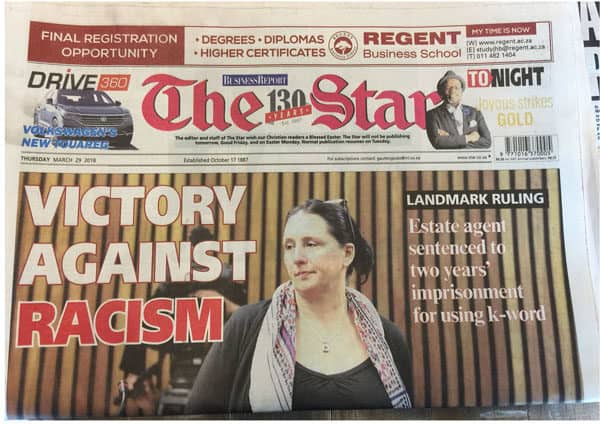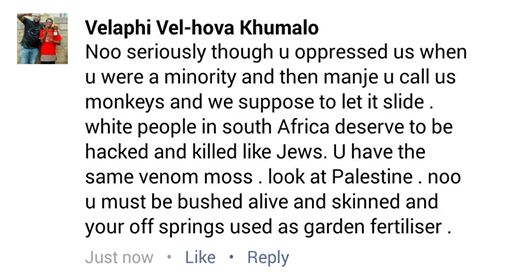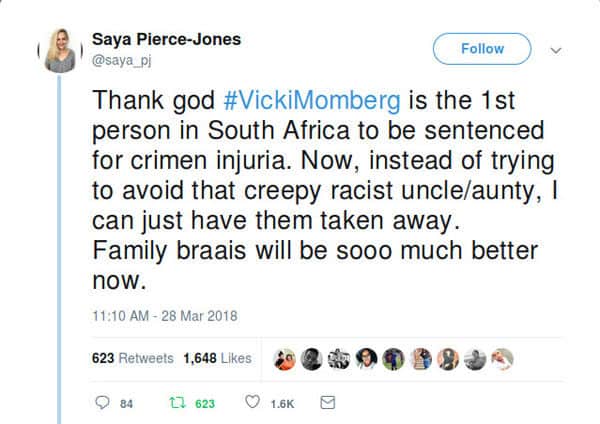Vicki Momberg: South Africa Becomes the USSR of Race
Dan Roodt, American Renaissance, March 30, 2018
South Africa’s ANC regime is about to pass a draconian piece of legislation on “hate speech” directly aimed at whites. However, even before “The Prevention and Combating of Hate Crime and Hate Speech Bill” could become law, a minor district judge or “magistrate” in Randburg, a suburb of Johannesburg, sentenced Vicki Momberg to an effective two years prison sentence for using the “K-word” in an altercation with a black policeman.
In South Africa the term “kaffir” (“heathen” in Arabic) is the equivalent of the US “N-word.” Both white liberals and members of the black elite have become obsessed with the word, which to them is the apotheosis of white racism. So when a cellphone video of Vicki Momberg, an estate agent from the coastal city of Durban, began circulating on social media in 2016, the full might of the state was brought to bear on her in a way that would be unthinkable if she were black.
She had just been robbed in her car by blacks in a smash-and-grab attack, but that counted for nothing and was not even taken into account by the female Indian magistrate. Pravina Raghoonandan sentenced her to three years’ incarceration, of which one year was suspended for three years. In a country where vicious crimes such as murder, rape, and torture are commonplace, meting out such a heavy sentence to someone who had merely breached a language taboo seemed outrageous. But of course, Miss Momberg was white, and the police constable she had insulted in February 2016, David Mkhondo, was black.
After being found guilty of crimen injuria, an old-fashioned form of criminal libel in South Africa, Miss Momberg was led to the court cells and spent her first night behind bars in Soweto’s notorious all-black prison for hardened criminals, nick-named “Sun City,” after the casino resort.
Crimen injuria is a common-law crime in South Africa that is defined as “unlawfully, intentionally and seriously impairing the dignity of another.” Although it fell by the wayside in modern times, it has been used in recent years by South Africa’s ANC regime to persecute whites suspected of a “racist” attitude. The new “hate crimes” bill will curtail freedom of speech even further and make it easier to prosecute whites who rebel against black authority.
During her argument with police while reporting the attack on her, Miss Momberg used the word “kaffir” 48 times, according to court documents. This fact was emphasized repeatedly in mainstream media reports, supposedly because it made her flaunting of the rules that much more egregious and worthy of punishment.
The Star newspaper in Johannesburg carried the headline “Victory over racism.” Adriaan Basson, the editor of News24.com, the country’s largest online news portal, entitled his piece on Miss Momberg, “Nowhere to hide for racists like Vicki Momberg anymore.” According to Mr. Basson, “It is the first time (that I am aware of) that someone will be imprisoned for using racist language in our country’s history.”
Some blacks on social media were calling for the death penalty for Vicki Momberg, a legal impossibility, since our liberal Constitutional Court had abolished it, mainly to protect the almost 100 percent black and colored class of murderers who kill about 50,000 people every year.
A poll by the public broadcaster, SABC, found that 57 percent of its TV viewers were in favor of a still harsher sentence of “more than five years imprisonment” for Vicki Momberg. In fact, most murderers in South Africa only serve an effective term of five years before they are let out on parole, especially if they behave well.
South Africa’s main opposition party, the liberal DA (Democratic Alliance), which heavily depends on white voters, welcomed the prison sentence: “We trust this ruling will be a deterrent to those who harbor any racist sentiments.”
A lone liberal-Marxist commentator, Rebecca Davis, expressed concern over the effect the sentence might have on freedom of speech. Writing on the Daily Maverick website, she said:
It has been reported that the case is the first in South Africa in which a person found guilty only of crimen injuria has been sentenced to prison. . . . The freedom of expression implications of this will need to be teased out by legal experts.
“Teased out by legal experts.” Yes, sure. If you’re white, you insult or complain to a black official at your peril. Thanks to affirmative action, the entire state bureaucracy is loaded with officials who are hardly literate, whether in the police, the court system, or at the Internal Revenue Service. White taxpayers regularly lose money from their bank accounts, since black bureaucrats can act completely unreasonably according to special legislation that lets them confiscate funds without a court order. The cumulative effect of all this is a smoldering anger on both sides of the racial divide that could erupt at any moment.
In June 2017, Miss Momberg was fined R100,000 ($8,500) by the Equality Court, which she had to pay to the black policeman she had offended. However, proceedings in South Africa’s Equality Courts take place under civil, not criminal law, unlike the charge of crimen injuria.
In effect, Miss Momberg had to pay both civil damages and go to prison for using the word “kaffir.” Although the court was told that Miss Momberg had previously refused to be served by black policemen in Durban more than a decade ago, she had never been convicted of an offense. Legally, she was therefore a first offender, and would under normal conditions have qualified for a lighter, suspended sentence, a fine, or a combination of the two.
A South African lawyer, Advocate Albert Murphy, characterized the sentence as “disproportionate.” He tweeted:
In my view the Momberg judgment is disproportionate and obviously politically inspired. What she did was wrong but certainly did not justify a prison sentence. White people are daily subjected to vile and murderous comments and songs from public platforms and no action is taken?
Miss Momberg’s case contrasts vividly with that of Velaphi Khumalo, an ANC member and official of the provincial arts and culture department in the Gauteng Province. He wrote on Facebook that “white people in South Africa deserve to be hacked and killed like Jews.”
After a public outcry, Mr. Khumalo was finally charged by the Human Rights Commission with “hate speech.” Unlike Vicki Momberg, who merely used an offensive word, Mr. Khumalo called for white genocide. However, to date he has not only kept his job as a provincial official, but his “prosecution” by the Human Rights Commission has also been extremely protracted and without any visible result.
The Momberg case has demonstrated that giving offense to blacks is a serious crime in South Africa. In the moments before her outburst, Vicki Momberg was robbed violently and her car broken into with her behind the wheel. Probably, the perpetrators will never be brought to book, while she was persecuted for her verbal transgression in a fashion reminiscent of Soviet “show trials,” meant to bolster the regime and instill fear in potential opponents.
The cynicism and schadenfreude of white liberals also fit the Soviet mold, as in this tweet by a blonde woman from Cape Town in which she looks forward to having her elderly racist relatives taken away from family braais (barbecues).
There is a slim chance that Miss Momberg’s sentence could be reduced on appeal. But the Indian magistrate denied her bail, pending the appeal, so she would have to stay in prison while first applying for leave to appeal and then the appeal itself, which could take at least a year. By the time she gets to a more reasonable judge, she might have served her two years. South African prisons have deteriorated to a third-world level, and Vicki Momberg’s safety is by no means assured.
It is significant that during the drawn-out murder trial of disabled athlete Oscar Pistorius, he was allowed out on bail until the moment when he had finally exhausted all appeals. Clearly, in South Africa it is not so serious to kill someone as to say the word “kaffir,” which seems to be an affront not only to individual blacks, but also to the system of black supremacy under which we live.


















